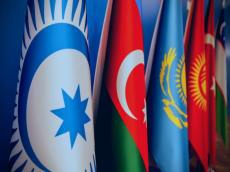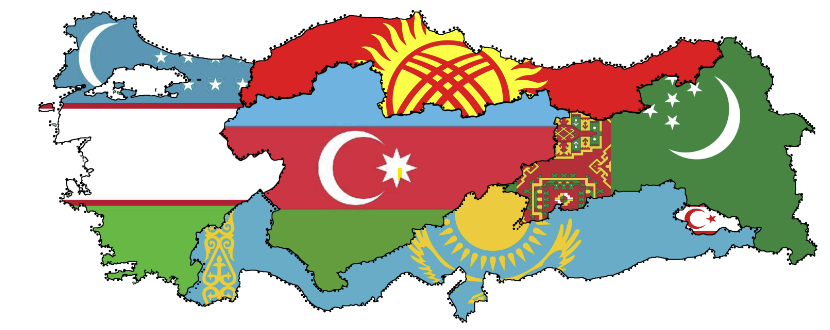|
|
TODAY.AZ / Politics
Azerbaijan's cooperation with Turkic states has potential to enhance regional stability
16 February 2024 [16:24] - TODAY.AZ

Strengthening mutual trust between the parties, establishing peace in the region and the world, promoting a common approach to foreign policy issues, and many other assets are what make up the core of the organisation of the Turkic states. During his speech at the swearing-in ceremony, President Ilham Aliyev tried to emphasise the importance of the above-mentioned advantages for the reliable and healthy future of the country by saying, Our family is the Turkic world.
"If someone thinks that we should look for a family elsewhere, I can say that there is no place waiting for us and they do not hide it anymore. If in previous years, particularly during the occupation period, they tried to lure us with certain promises to mislead us, i.e. to let dust in our eyes, then today these masks have been torn off and the dividing lines are clearly seen here. We did not draw these dividing lines, we are against them. Today we clearly see these dividing lines even in the South Caucasus, where there are only three countries.
In that case, should we bow down to those who do not want to accept us somewhere? Not at all, it will not happen! Our family is the Turkic world. We feel ourselves perfectly. We have brotherly relations with all member countries of the Organization of Turkic States, and our policy is to strengthen the Organization of Turkic States. It is a big geography, big territory, big military force, big economy, natural resources, transportation routes, young population, growing population, and we are peoples of the same family, of the same roots. Can there be a unity stronger than that? Of course not."- President of Azerbaijan Ilham Aliyev.
The world institutions, as well as organisations like the UN, EU, PACE, etc., have so far played into the hands of the ideology of Western elites, "order out of chaos". We witness that the policy carried out on a regional and global scale is carried out with the help of certain circles, certain centres of power, and serves their own interests. In such conditions, uniting the capacities and efforts of Turkic states means ensuring the national interests of each of them individually and all of them as a whole.
At present, there are many factors contributing to the rapprochement of Turkic-speaking states, and first of all, it is the strong political will of the leaders of all the states that are members of the Organisation of Turkic States. The formation of such an optimal environment is conditioned at the same time by the identity of language, religion, traditions, similarity of cultures, and, of course, the will of the nations in the world.
The Turkic world covers a considerable territory, starting in Eastern Europe and extending to Central and Eastern Asia. It includes such states as Turkiye, Azerbaijan, Kazakhstan, Uzbekistan, Turkmenistan, Kyrgyzstan, and others.
Azerbaijan, together with brotherly Turkiye, is a leader in the rapprochement of Turkic states. The Cooperation Council of Turkic Speaking States was established on October 3, 2009, in Nakhchivan, thanks to the efforts of Azerbaijani President Ilham Aliyev. At the VIII summit of the Cooperation Council of Turkic Speaking States held in Istanbul on November 12, 2021, a decision was signed to rename the organisation the Organisation of Turkic States.
The future of the Turkic World can be determined by many factors, including political stability, economic development, cultural ties, and international relations. Several key areas that may influence its development can be identified, including:
1. Economic cooperation: Strengthening economic ties among the Turkic countries can contribute to their common prosperity. The development of trade, investment, and infrastructure projects can drive the region's growth.
2. Political Integration: Turkic countries can seek to strengthen political integration through the creation of alliances or alliances to address common problems and protect common interests.
3. Cultural Exchanges: Continued and increased cultural exchanges among the Turkic World countries can help build mutual understanding and trust among the peoples of the region.
Azerbaijan plays an important role in the Turkic World as a country with a rich history, cultural heritage, and modern economy. The country has the potential to become a key player in regional cooperation, especially in the fields of energy, transportation, and trade.

However, it is important to note that the future of the Turkic World depends on many variables, including geopolitical shifts, economic conditions, and internal political processes in each of the countries in the region. Stability, mutual understanding, and cooperation will be key to achieving prosperity and well-being in the Turkic world and realising Azerbaijan's potential in this context.
Overall, Azerbaijan's cooperation with other Turkic countries in the fields of energy, transportation, and trade has great potential to enhance regional stability, economic growth, and prosperity. These efforts can also contribute to the creation of a common platform for cooperation to address contemporary challenges and problems facing the Turkic world.
1. Energy: Azerbaijan has huge reserves of oil and natural gas, especially in the Azerbaijan sector of the Caspian Sea. This allows it to be a major energy exporter. Turkic countries such as Turkiye and Georgia are Azerbaijan's key energy partners. Projects such as long-distance gas pipelines (e.g., the Trans-Anatolian Pipeline) contribute to the region's energy security and export opportunities. With the smooth transition to green-clean-renewable energy, Azerbaijan is positioning itself to become a favourite and major exporter of green energy.
2- Transportation: Azerbaijan has a strategic location at the intersection of many international transportation corridors. It plays an important role in transit, providing access to sea and rail routes for other countries in the region. Projects such as the Southeast Europe-Western China Railway Corridor and maritime transportation routes across the Caspian Sea contribute to the development of transportation infrastructure and strengthen ties between Turkic countries.
3. Trade: Cooperation in the field of trade is a key element in strengthening economic ties between the Turkic countries. Azerbaijan is actively developing trade relations with other Turkic countries, particularly with Turkiye and Kazakhstan. The signing of various trade agreements and participation in international exhibitions and fairs contribute to the expansion of trade exchange and economic prospects.
Azerbaijan is a major producer of oil and gas. According to the International Energy Agency (IEA), Azerbaijan produced about 790 thousand barrels of oil per day and 21 billion cubic metres of natural gas per year in 2020. Most of this production is exported, mainly to European and Asian countries.
In January of the current year, Azerbaijan exported about 523,553.89 tons of oil worth $ 296,946.74 thousand to Israel. Thus, Israel took first place in Azerbaijan's total oil exports. Thailand took second place in Azerbaijan's total oil exports. During the reporting period, 189,175.53 tons of oil worth $115,322.09 thousand were exported to this country.
Azerbaijan also plays a key role in transit transport communication between the East and West. For example, the railroad route of the Southeast Europe-West China Railway Corridor through Azerbaijan provides an alternative route for trade between China and European countries. Azerbaijan Railways transported more than 6 million tons of cargo in 2020.
Trade turnover between Azerbaijan and other Turkic countries is also significant. For example, in 2020, trade turnover between Azerbaijan and Turkiye amounted to about $ 3.5 billion, and with Kazakhstan, about $ 145 million. These figures reflect the significant potential for further expansion of trade and economic cooperation between Turkic countries.
Overall, the statistics confirm the importance of Azerbaijan's cooperation with other Turkic countries in the fields of energy, transportation, and trade. This potential can be maximised to contribute to the development of the region and strengthen its economic integration.
Compared to the corresponding period of 2022, Azerbaijan's trade turnover with Turkic states increased by 40 percent in January-September 2023
The Turkic countries, located at the crossroads of Europe and Asia, have a unique geopolitical position that provides them with access to a variety of markets and opportunities for trade and transit of goods and services between different regions.
Many Turkic countries possess significant natural resources such as oil, natural gas, minerals, and agricultural land. This allows them to develop their own economies and play an important role in world energy markets. Turkic countries have a rich cultural and historical identity, which can be an attractive factor for tourists and investors. The diversity of cultures, languages, and traditions in the Turkic world creates a unique atmosphere for tourism and cultural exchange.
Some Turkic countries, such as Turkiye, Kazakhstan, and Azerbaijan, have achieved significant success in economic development over the past decades. Their high rate of economic growth, innovation, and infrastructure development make them attractive for investment and business.
Compared to the more bureaucratic systems of Western and European countries, Turkic countries can be more flexible and fast in decision-making, especially in business and investment. This can contribute to faster project implementation and economic development.
URL: http://www.today.az/news/politics/244945.html
 Print version
Print version
Connect with us. Get latest news and updates.
See Also
- 15 September 2025 [15:51]
Citizens of Azerbaijan are at center of all our political steps: President - 15 September 2025 [15:21]
Azerbaijan confers "Dostluq" order upon director general of ICESCO - 15 September 2025 [15:11]
Documents detailing mass attacks on Azerbaijani residents in Khankendi presented in trial of Armenian citizens - 15 September 2025 [14:39]
Dutch probation officials visit Azerbaijan to strengthen cooperation in justice reforms - 15 September 2025 [13:33]
President Ilham Aliyev receives ICESCO Director General - 15 September 2025 [12:43]
Azerbaijan marks 107th anniversary of the liberation of Baku - 15 September 2025 [12:21]
Baku, Astana strengthen ties in law enforcement training - 15 September 2025 [11:50]
President Ilham Aliyev congratulates co-presidents of Republic of Nicaragua - 15 September 2025 [11:30]
President Ilham Aliyev meets residents of Badara, Dashbulag, Seyidbeyli, and Shushakand villages of Khojaly - 15 September 2025 [11:03]
President Ilham Aliyev visits Badara village in Khojaly district
Most Popular
 Next meeting of Azerbaijan’s Economic Council held under Prime Minister’s leadership
Next meeting of Azerbaijan’s Economic Council held under Prime Minister’s leadership
 Qatar to host emergency Arab-Islamic Summit after Israeli strike on Doha
Qatar to host emergency Arab-Islamic Summit after Israeli strike on Doha
 Azerbaijan and Iran to host reciprocal cultural days
Azerbaijan and Iran to host reciprocal cultural days
 Chinese delegation explores cooperation on Trans-Caspian International Transport Route
Chinese delegation explores cooperation on Trans-Caspian International Transport Route
 ADY expands train services on Absheron Circular Route
ADY expands train services on Absheron Circular Route
 SOCAR Türkiye and TANAP hold board meetings in Istanbul
SOCAR Türkiye and TANAP hold board meetings in Istanbul
 Azerbaijan’s Defense Minister Zakir Hasanov condoles Pakistan over deadly terror attack
Azerbaijan’s Defense Minister Zakir Hasanov condoles Pakistan over deadly terror attack
